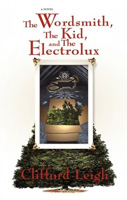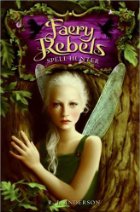
The Wordsmith, the Kid, and the Electrolux
by Clifford Leigh, a Review
Published by OakTara Publishers, 2008. 229 pages.
Genre: Christian allegory, most suitable for teens and adults
The Wordsmith, the Kid, and the Electrolux is the story of Corey Smith, a very self-centered, self-indulgent kid who has rejected his loving parents and chooses to steal from them to feed his craving for sweets from the local ice cream truck. A sinner, like the rest of us, definitely.
Late one night, Corey awakens to hear his family’s vacuum cleaner whooshing away in the closet, all by itself. He investigates, is drawn to open a family photo album in the attic above the closet, and finds himself in a dreamlike sequence that lasts nearly all of the rest of the book.
It’s not a fantasy story with unicorns and dragons, but an allegory where people and things take on meaning based on their parallels in real life. Corey finds himself falling headlong into another world, alongside a giant tree. He is inside the photo album, falling alongside his family tree. Finally he lands and encounters some other children, including Ben and Benjamin, twins. Ben is the “bad” one, always suggesting the morally wrong choice, while Benjamin clearly has thought a lot about moral choices and articulates the “good” choice.
Standing alongside the family tree, they see some giant “photographs,” part of the picture album they find themselves in. In one of them, they see a kid, a young goat, being sent off into the desert carrying the sins of a nation. That’s the Kid referred to in the title.
Another picture contains a Wordsmith who is clearly designing and creating a contraption in a shop. A man and a woman wander into the shop. They can’t see the Wordsmith, and begin speculating about where the contraption came from. Benjamin and Corey decide to enter the room and try to tell them that the contraption was really made by the Wordsmith, and didn’t come into being by itself, and shouldn’t be worshipped–two options the adults had come up with.
So the three boys chase after the couple and tell them about the Wordsmith, to no avail. The couple takes the three boys home with them, and some adventures ensue, all very dreamlike in character. There are some extensive philosophical discussions, focusing on why the Kid had to die for sins, and what good that did for us.
Finally we figure out what the Wordsmith, the Kid, and the Electrolux collectively are. I’ll let you guess.
So, do I like it?
A young child, listening to this, might get restless. But the content is great for teens. I certainly wish I had read this book when I was a teenager. It would have explained to me why Jesus’s death on the cross meant my sins were paid for. That was a huge stumbling block to me at the time, for years, and this book makes it understandable and believable.
So, if you’re looking for a great story like the Narnia tales, look elsewhere. But if you’re looking for some answers about the basics of the Christian faith, this is a good book. It’s also very readable, with a central character you can identify with in his petty sins and his search for answers.–Phyllis Wheeler


